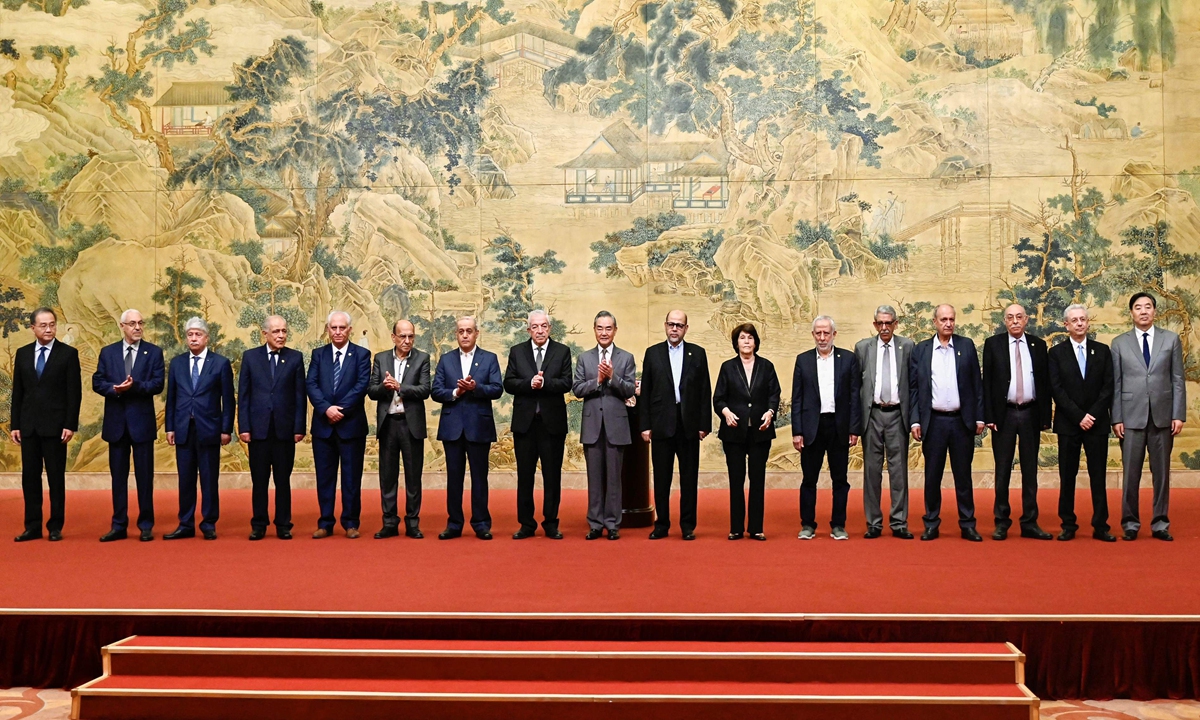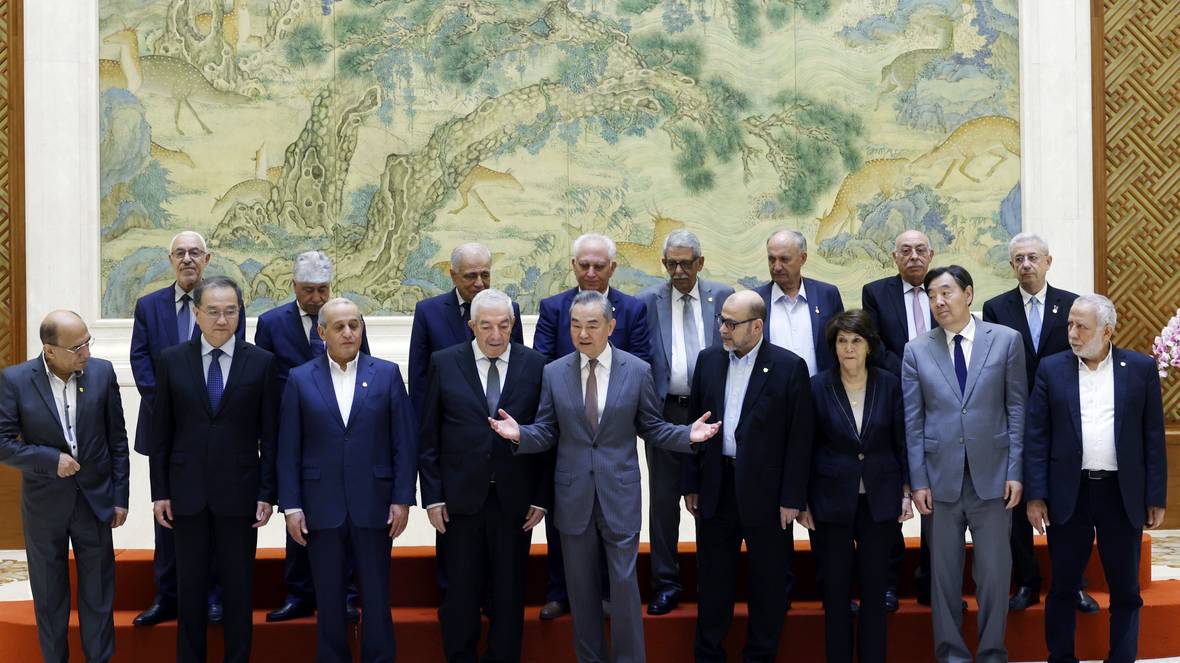July 25, 2024
China mediates between Palestinian factions to form a future government in Gaza
By Abdus Sattar Ghazali
High-level representatives from 14 Palestinian factions held a reconciliation dialogue from Sunday to Tuesday at the invitation of China and signed the Beijing Declaration on ending division and strengthening Palestinian unity, the Global Time reported adding:
This marks the first time that representatives from 14 Palestinian factions have gathered in Beijing for reconciliation dialogue, bringing valuable hope to the long-suffering Palestinian people, Mao Ning, a Chinese Foreign Ministry spokesperson, said at a press conference on Tuesday.
The declaration appreciates China's sincere efforts to support Palestinian rights, ending division, and unifying Palestinian positions. It emphasizes the need to convene a broad and fully authorized international conference under the auspices of the UN, with regional and international participation, the spokesperson said.
The dialogue in Beijing also demonstrated a positive and constructive spirit, agreeing to achieve comprehensive national unity under the framework of the Palestine Liberation Organization (PLO), the sole legitimate representative of the Palestinian people.
It calls for establishing an independent Palestinian state with Jerusalem as its capital, based on relevant UN resolutions, maintaining the territorial integrity of Palestine, including the West Bank, Jerusalem, and Gaza.
The declaration also states that a temporary national reconciliation government will be formed according to the consensus of Palestinian factions and the current Basic Law of the Palestine, to undertake Gaza reconstruction and prepare for general elections as soon as possible in accordance with the adopted electoral law.
The Associated Press said previous similar declarations have failed, raising doubts about whether the China-sponsored negotiations might lead to reconciliation between Hamas, which has ruled the Gaza Strip for 17 years, and Fatah, the main force in the U.S.-backed Palestinian Authority that administers parts of the occupied West Bank.
The declaration comes at a sensitive time, as the war in Gaza rages into its 10th month and as Israel and Hamas are weighing an internationally backed cease-fire proposal that would wind down the war and free dozens of Israeli hostages held by Hamas.
One of the thorniest issues is the question of who will run Gaza after the war. The unity efforts are motivated in part by Palestinians’ desire to offer a scenario for postwar rule.
Israel and the United States rejected the pact
Israel and the United States rejected the pact. The U.S. and other Western countries have refused to accept any Palestinian government that includes Hamas unless it expressly recognizes Israel — a factor that has helped wreck past unity attempts, along with the factions’ own competition for power, the Associated Press said adding:
Reacting to the announcement out of China, Israel’s foreign minister said no joint governance between Hamas and Fatah in Gaza will take place “because Hamas’ rule will be crushed.”
U.S. State Department spokesman Matthew Miller said, “We made clear we want to see the Palestinian Authority” with a governing role in Gaza, “but no, we do not want to see a role for Hamas,” which he said has “blood on its hands.”
China proposes a three-step initiative
According to Global Times, Chinese Foreign Minister Wang Yi said at the closing ceremony that "To help get out of the current conflict and predicament, China proposes a three-step initiative: The first step is to achieve comprehensive, lasting and sustainable cease-fire in the Gaza Strip as soon as possible, and ensure access to humanitarian aid and rescue on the ground."
"The second step is to make joint efforts toward post-conflict governance of Gaza under the principle of 'Palestinians governing Palestine.' Gaza is an inseparable, integral part of Palestine."
"The third step is to help Palestine become a full member state of the UN and get down to implementing the two-state solution," the Chinese foreign minister said.
China has moved to reinforce its diplomatic stature, casting itself as a mediator of reconciliations. It had already brokered in March 2023 a deal normalizing relations between Iran and Saudi Arabia.
Chinese officials have ramped up advocacy for the Palestinians in international forums in recent months, calling for a larger-scale Israeli-Palestinian peace conference and a specific timetable to implement a two-state solution.
Mustafa Barghouti
The announcement of the Beijing Declaration immediately shocked international public opinion. Mustafa Barghouti, secretary-general of the Palestinian National Initiative, told the Global Times that the Beijing Declaration goes "much further" than any other reached in recent years. The scene of representatives from 14 factions signing the declaration marks an important historical moment in the Palestinian liberation movement and brings valuable hope to the long-suffering Palestinian people.
The Beijing Declaration is a crucial step toward resolving the Palestinian issue and achieving peace and stability in the Middle East. It is also the first time that an internal Palestinian reconciliation document has been organized by a country outside the Arab world. When asked why this conflict can only be resolved in Beijing rather than elsewhere in the world, Mustafa Barghouti said it is because China is "very decent and honest." The sincere efforts made by China to support the rights of the Palestinian people, end division and unify the Palestinian stance have been highly praised by all factions in the Beijing Declaration, which is well-deserved.
Ashraf Abouelhoul, a specialist on Palestinian affairs and managing editor of the Egyptian state-owned paper Al-Ahram, was quoted as saying that the previous similar declarations had not been implemented and nothing would happen without U.S. approval.
“Forming a unity government with Hamas is rejected by the United States, Israel, and Britain. There is a consensus among those countries to exclude Hamas from any role in the day after the war,” Abouelhoul said.Dismissing the China meeting as “a celebratory event”, he said it was “impossible to resolve the problems between Palestinian factions in just three days”.
What China hopes to achieve in the Middle East through Hamas-Fatah talks?
For some experts, China is seen as a more reliable mediator than the US. But will it succeed in ending the decades-long dispute and uniting the Palestinian front?
BY AYSE BETUL AYTEKIN
China's Foreign Minister Wang Yi welcomed Palestinian leaders at the Diaoyutai State Guesthouse in Beijing on July 23, 2024.
Leaders of Hamas and Fatah, Palestine’s two main political factions, announced their readiness to unite after decades of dispute during a much-publicised meeting in China earlier this week.
By signing the "Beijing Declaration”, the two parties agreed to end historic political divisions and strengthen Palestinian "national unity”.
The summit in Beijing also included 12 other Palestinian factions, as part of the China-led reconciliation efforts that began with an initial yet inconclusive meeting held in Beijing in April.
While questions persist about the reliability and sustainability of the significant deal, which could mean Palestinians finally have a strong and united leadership, it’s China's role as peacemaker that has drawn global attention.
“The Middle East serves as a microcosm of [what] the new order China offers,” Diren Dogan, a visiting fellow in international relations at Oxford University, tells TRT World.
Following its role in facilitating an agreement between Iran and Saudi Arabia in March 2023, two nations with a long-standing rivalry, China’s involvement in efforts to achieve Palestinian unity—potentially as a precursor to a two-state solution with Israel—could further solidify its emerging role as a reliable mediator.
Dogan explains that the Asian country’s outreach to the Middle East, which began in late 2022 with efforts to establish new partnerships with countries such as the United Arab Emirates and Saudi Arabia, was significant.
“It aimed to involve regional leaders in what it termed the ‘Chinese Century’. However, the outbreak of the Israel-Palestine conflict disrupted this process,” Dogan adds.
Not just humanitarian
Experts note that China’s involvement in the Palestinian issue is driven by humanitarian concerns and pragmatic considerations.
“It is the largest trading partner of the Middle East and the biggest importer of Middle Eastern oil… it seeks partnerships rather than alliances in the region,” Degang Sun, professor and Director of the Center for Middle Eastern Studies at Fudan University, tells TRT World.
While China’s Middle Eastern policy once sought economic benefit, putting aside political entanglements in the early 21st century, Sun says that the country shifted its regional policy and is now ready to “project not only its hard economic power but also its soft diplomatic power”.
Stabilising the Middle East is crucial for China, particularly given its investments in the Belt and Road Initiative, the billion-dollar global infrastructure project which links the Asian nation to the rest of the world via the Middle East.
The Asian giant’s continued influence in the Middle East could lead to further shifts in global power dynamics or at least seal its role as a major player in the region. Finding a solution to the ongoing Israel-Palestine conflict may just be the way.
Deep-seated rift
A unified Palestinian leadership is a crucial step toward achieving peace and ideally ending Israel's genocidal war in Gaza,ᅠwhich has persisted for over 10 months and claimed almost 40,000 lives, and the 76 years of illegal Israeli occupation of Palestinian lands.
However, achieving this unity has been proven challenging due to deep-seated differences between the factions.
Fatah, the main faction of the Palestine Liberation Organization (PLO), has held partial control over the Palestinian territories in the occupied West Bank since the Oslo Accords were signed in 1993. Hamas, a political organisation with an armed resistance wing Qassam Brigades, has governed Gaza since 2007 after winning legislative elections in 2006.
While the Fatah-led PLO is the only group that has been allowed to represent the Palestinian people at the United Nations since 1974, when it was conferred observer status under the leadership of Yasser Arafat, Hamas has long been dismissedᅠas a "terrorist group" by some members such as the UK, US, and Canada.
The rift between these two predates the elections, resulting in an armed conflict in 2006, and is primarily rooted inᅠpolitical and ideological differences.
Over the years, both factions have repeatedly sought to reconcile and unify their struggle against the Israeli occupation. But despite meetings mediated by several heads of state since 2006 in cities such as Istanbul, Moscow, Mecca, Cairo, Beirut, and Doha, these efforts have consistently failed.
The meeting in Beijing earlier this April marked a new attempt at unity, which is considered by some as potentially more hopeful than previous attempts because China is viewed as “a more reliable and neutral, less partisan” proponent than the US or Europe, according to Richard Falk, a professor emeritus of international law at Princeton University.
Falk, a former UN Special Rapporteur on Human Rights in Occupied Palestine, told TRT World that China’s supportive stance on Palestinian statehood creates stronger incentives for a cooperative approach.
“It induces both sides to be more respectful toward the Beijing Declaration that sets forth the terms of the agreement reached,” he adds.
US decline, China’s rise?
The new declaration says a temporary unified leadership framework based in Ramallah will be established in the upcoming term.
This will help move the Israel-Palestine negotiation process away from being predominantly under US control, says Dogan.
Many believe that the American administration has lost credibility due to its unwavering support for Israel and its inability to influence an end to the bloody war since October 7. But its declining image goes back even further to the 1990s Gulf War, says regional expert Dogan.
China has capitalised on this diminishing image to publicly critique America, and its failure to find a viable solution to the persistent Israel-Palestine conflict is a continuation of this decline.
China's influence now is all the more significant: “If Palestine can establish its own unity and integrity and repair internal divisions, it can stand on its own, even if the US continues to support Israel,” Dogan tells TRT World.

|
Published since July 2008 |
Your donation
is tax deductable.
The Journal of America Team:
Editor in chief:
Abdus Sattar Ghazali
Senior Editor:
Prof. Arthur Scott
Special Correspondent
Maryam Turab




